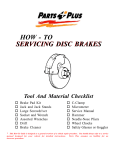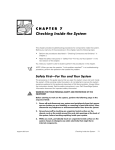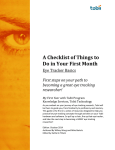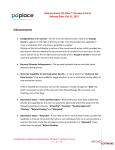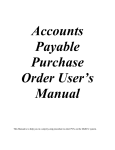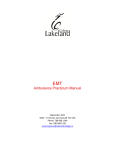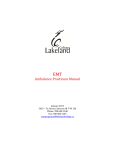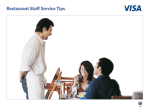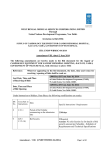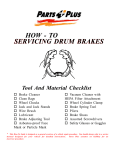Download Operator
Transcript
Vicki Operator “Doctors are so dependent on the techs. That’s why it’s so important to know the ins and outs, to be able to troubleshoot.” Age: 31 Education: AS in Radiology, certification in ultrasound Title: Cardiovascular technician Years in the field: 5 Spends most of the day in the cath lab doing cases. Uses Galaxy 2 to 3 times a week. Goals To be the best at what she’s doing, have answers for everything, have people look up to her. To give exceptional patient care. To have the doctors’ confidence, have a rapport with them, be a resource for them. Needs Troubleshooting info. Hands-on experience; immediate feedback; guidance. Formal training. Logical, step-by-step material. Practice. More info about interpretation. Retraining and refreshers. Anxieties Basic learning approach Effectiveness When something goes wrong, she… An emergency, and no solution. IVUS is rarely planned: getting it up and running fast. Physicians’ impatience; hectic pace. Making a mistake. Personal embarrassment. “It feels like a computer.” Stupid little things. Tends to be a self-learner. Tires to troubleshoot a problem herself before she asks somebody. But has no problem asking to get the right answer. Willing to look things up. A In-service C Experimenting B Class C Workbook B Interactive tutorial 1. 2. 3. 4. C Learning from a colleague F Video, F User’s guide Troubleshoots it herself. Checks the user’s guide. Calls the support hotline. Calls the sales rep and checks online help. Best learning experience “The class at Washington Heart. We got to stent a pig. That was awesome—actually doing it. You actually got to be the doctor and actually see how to do it, you had to really concentrate. That was way above average.” Worst learning experience “We ran through a system only once or twice and were expected to know it. There were so many steps, it was so cumbersome, and you have to know what you’re doing because the device blocks the blood flow. We just aren’t that confident with it.” She’s really learned the system when… Obstacles Can do it without hesitation. Had done what they’ve asked and can go another step. Can teach it to others. Infrequent use. Lack of practice; lack of experience; lack of time. Mistrust. 800 numbers as a substitute for training. Learning on the job. Preliminary – For Review Only 1 Not For Distribution Being overwhelmed by all the new systems to be learned. Personality Technical Profile High expectations of herself. Loves working in the lab. Deeply compassionate. Gets along with people really well; likes to help people out. Confident and efficient. Hands-on learner. Unsophisticated, but competent, computer user. Uses computer at work for recording charges, patient data, email. Windows computer at home for email, surfing the Web, occasionally MS Word, MS Money. Learns using online tutorials and online help. Occasionally asks her neighbor’s teenage son for help, or the IS guy at work. Has used the user’s guide that came with MS Money, but can’t remember what for. Responsibilities • Set up Galaxy quickly (few intravascular ultrasound procedures are scheduled in advance) • Prep the patient; administer medications • Make sure the patient is safe • Reassure the patient; make sure the patient feels safe • Monitor the patient throughout the procedure • Enter patient data • Record and play back ultrasound images • Make sure images are high quality • Locate points of interest at physician’s request • Take good measurements; annotate images • Identify areas and characteristics of an image; make suggestions • Provide the physician with more accurate information than can be seen on the angiography • Respond to other requests from physician • Function effectively in a hectic environment Preliminary – For Review Only 2 Not For Distribution Goals To be good at what she’s doing; to have answers for everything; to have people look up to her. “I like to know I’m doing the best job, so I want to take every opportunity that comes along to know the most about what I should be doing.” To provide exceptional patient care. “We need to do a good job, we need to be resourceful. We need to make the patient comfortable. There’s a deep enjoyment when the patient is critical, they open up the artery, and the patient is thoroughly indebted to you. And this past week we had a couple of bad situations. We had a group of us that were able to save a couple of patients based on expediency and some other factors involved.” To be on the cutting edge. “Sometimes I find it frustrating, it’s a difficult field to keep up in. So what I want most is to just keep abreast of changes, to stay current with things. I love attending seminars.” To have the doctors’ confidence. “I get a really great satisfaction when I can do something forwards and backwards. They won’t ever sense any apprehension from me. The better we know it, the more confidence the doctors have in us, the more they’ll want to use it. If they’re not convinced we’re confident, they’re not going to bring up the device.” To have a rapport with the doctors; to be a resource for them. “They look to me and ask my advice. I listen to their thoughts on a subject, but they have enough respect for me if I think something isn’t being done correctly. To be a resource for the doctors is something everyone would like to strive for.” To get things done. “The days that I don’t get all those done—it’s not a life and death situation—but I just like that sense of completing it.” Preliminary – For Review Only 3 Not For Distribution Needs Information that will help her troubleshoot. “People come to me to find out what’s wrong.” Hands-on experience; actual participation when she’s learning. “Some in-services are geared to give you knowledge. But when you have a piece of medical equipment coming in, you’re supposed to know how to work it. Allowing you to actually participate in it is important. The hands-on thing is the best way for me.” “Someone there”; immediate feedback; guidance. “I prefer the one-on-one with the sales rep, then you doing it. They can confirm whether you’re doing it right or wrong. If someone was there they could say, this is what you need to do. I could ask a live person a question to clear up any doubts. Learning it ‘the longhand way’—experimenting with it—is nice, but I prefer guidance.” Formal training. “That’s the best way to learn, to get the background, and then to come in and apply it in the field. I just kind of like that. Before it gets delivered. I like formal training.” Logical, step-by-step presentation of the material. “Manuals, tutorials, online help—if they’re clear and step-bystep, if they move forward in a logical manner and not jump all over the place—they’re good if they present a logical progression from easy to more advanced.” Practice: the opportunity to prepare in advance. “You don’t really learn a system until you’re pushing buttons in a case. But you get familiar with the system, you get comfortable with the system beforehand. You practice on it. I want to be prepared in advance.” Practice: the ability to review old cases. “On my own without a patient, I looked over old IVUS films, looked at what people did. Then what I’ll do is pull up a measurement and I’ll say to myself, give me the vessel diameter, give me the lumen diameter, and I just go through how quick I can proceed to those buttons, pull them up, make the measurements, and store them. Then I’ll think, this isn’t right, then go back and retrace it.” More information about interpretation. “I attended an all-day IVUS course. It had a lot of economics behind it: why doctors should use IVUS. I wanted it to be about interpretation. The big thing for me is what I’m looking at. What is the extent of the plaque, is the stent fully deployed. And what suggestions you can make based on what you see.” Retraining and refreshers. “I’d prefer CDs, online tutorials on hand in the education library for review. And I’d expect retraining and refresher inservices to be scheduled with no quarrels.” Preliminary – For Review Only 4 Not For Distribution Anxieties “You’re in an emergency situation, and you don’t have a solution.” “Something breaks down, you’re in an emergency situation, and you don’t have a solution, you don’t know how to work it. The team isn’t up on all the advanced troubleshooting methods. That’s my biggest fear with new equipment.” Encountering something that wasn’t covered. “Being on my own and something comes up that wasn’t covered and you can’t get what you need because you can’t get past the problem.” Getting the equipment up and running as fast as possible. “I set expectations on myself so I can get it up and running in a timely fashion and not run into problems. I can’t say I get all bent out of shape about it, but I do have a little anxiety.” Making a mistake. “Just making a mistake during a case. Screwing up something live.” Personal embarrassment. “Because you’re too slow. You’re a senior person and you’re going back to being like a newbie. You just so totally don’t know it.” Stupid little things; “it feels like a computer.” “They’re all computerized now, so it’s a little trickier. So you don’t want to get caught not knowing how to send files over, how to delete files. Those are the stupid little things you don’t want to get caught not knowing. IVUS is more for people who are computer literate. It has the feel of a computer.” Lack of opportunity. “I use Volcano more. We had an in-service on Galaxy, then they took Galaxy out. They’ve brought Galaxy back, but I haven’t had an opportunity to use it. I would be very uncomfortable using it.” Physicians’ impatience; hectic pace. “The physicians want things to happen pronto. They’re usually so impatient. I just try to stay focused when it gets hectic because you’re trying to do 3 or 4 things.” Preliminary – For Review Only 5 Not For Distribution Effectiveness A In-service training Prefers in-service training by a sales rep to all other approaches. “I like the company that comes in and shows you how. You have somebody who’s knowledgeable who can show you the ropes of the equipment and let you actually get your hands on it and practice. My first choice is hands-on instruction.” It’s hands on. “The hands-on part makes it reassuring and complete.” The sales reps are knowledgeable. “It’s so nice to have someone who knows a piece of equipment forwards and backwards.” They stand by her. “I’d rather have someone come in, show you how it works, and then use it in a live setting with them there to help you troubleshoot it when problems arise.” They’re familiar. “We’ve had these same reps for a long time. We know them well. We have a good relationship.” They’re available. “You can call her any time, with any question. I have her cell phone number. She’ll come down whenever I want to help me out. If you have any questions, any doubts, you can always contact her to get a refresher.” They’re patient. “Very patient—patience is a big thing He’s patient and available. Patient and available.” B Class Likes classes… “…as long as the equipment is challenging and interesting to work with. It’s one of the best ways to learn.” Being hands-on is essential. “Just keep them not lecture-like.” She can work with the equipment when she’s not under pressure. “In the lab, there’s an urgency to get things done. So doing it in a classroom setting in a comfortable situation allows you to do it better when you get in the hurried situation.” Gives her a solid background that she can apply in the lab. “I don’t like to fly by the seat of my pants during a procedure.” Helps her troubleshoot. “Knowing the ins and outs is what I most look forward to, so I can help others.” Preliminary – For Review Only 6 Not For Distribution B Interactive Tutorial Likes the idea of an interactive tutorial. “I’m a show-me-how-to-do-it person. As long as it’s not dry. They have to be interesting to grab your attention, clear, and the vocabulary can’t be too technical.” Guidance is important. “I’d expect a tutorial would easily guide you through. They have to move forward step by step in a logical manner—not jump all over.” It’s a better way to learn than a book. “Anything that allows you to work part of the program as you learn it rather than read it stimulates you more, you feel more part of it. It allows you to put it into your brain. Anything that allows you to interact is beneficial.” It’s a better reference, too. She doesn’t like thumbing through a book. Likes the idea of better access to information. “I’d like to type in something and it would pull up exactly what I need.” Tutorials are especially valuable as a way of reinforcing what she’s learned in an in-service. “And I’d like to have some online tutorials and booklets about interpretation, really breaking it down on all the basics.” C Experimenting Sees good and bad sides to experimenting. She wants the quickest, most efficient way to learn. “It’s not a bad way. But a lot of productivity time is wasted. You have to go the long way round, rather than finding shortcuts. There are so many new programs, people are getting overwhelmed. I prefer guidance.” It has the advantage of being hands on. “I like a hands-on approach.” It’s great for review and practice. “I like to go back and review images and take measurements, erase them, and redo them for my own learning experience. It helps me keep up on things.” Preliminary – For Review Only 7 Not For Distribution C Learning from a colleague It’s a question of proficiency. “It’s another good way to learn, if they’re proficient.” It’s also a question of attitude. “Certain people are trying to show off, they’re trying to show you what they know, rather than trying to help you learn.” It’s a good way to get an answer to a question. “If I have a question and the person knows about it, has experience with the equipment, it doesn’t bother me at all. It takes less time.” Sometimes it simply has to be endured. “That’s the way it has to go. There’s the team. You’re only as strong as the weakest link. Everybody has to be on board with the same knowledge. It has to get passed along. Therein sometimes lies the problem.” It can be uneven. “One person has been effective, the other has not been. It varies based on who’s doing the teaching. One probably has a better way to do it.” C Workbook You can’t go on until you figure out the answer. F “You had to do it. You had to figure out the problem. It was at your own pace. You couldn’t go on until you understood what you had to learn. Yeah, that was a good way to learn. I wouldn’t be opposed to it. It’s something I’d try. But it’s not the best.” Video Feels neutral about videos at best. “Those are a little dry. I dislike them compared to an interactive tutorial. I’d like something more interactive.” Would accept it as an additional resource. “It could be an additional resource, not my primary way of learning—a way of getting a summary of how to use the system. I’d envision watching the video, not working with the system at the same time.” The length of the video is a factor. “Short things that move on are better than an hour, hour and a half type thing—you tend to lose interest.” Preliminary – For Review Only 8 Not For Distribution F User’s guide Dislikes having to learn from a user’s manual. “I’m a hands-on person. I learn better if someone is talking to me directly, showing me things, then allowing me to get hands on. I feel things click better that way.” Would grudgingly accept it… “…if it were user friendly, as long as they didn’t write it over your head. I love those Dummies books. They keep it simple. They give you the steps in a logical progression and highlights to remember.” But they’re okay as a reference. “I’ve gone back to it if there’s a piece of equipment we haven’t used in a while, or if I get stuck or need help with something.” Preliminary – For Review Only 9 Not For Distribution What Vicki does when something goes wrong 1. Troubleshoots it herself. “With any product there’s always a couple of things that come up unexpectedly that they tell you about that sticks in the back of my head. I’d usually go that route first.” 2. Checks the user’s guide. “If I knew where I could find the manual, if it was on hand, I’d look it up. But usually the manual isn’t with the equipment. It’s tucked away in somebody’s office.” 3. Calls the support hotline. “If it was needed for a case, I’d call support because that would be the fastest. On the other hand, I wouldn’t want to go through a whole thing with somebody back East or encounter a language barrier. A lot of people who do technical support have heavy accents. It’s frustrating because I can’t understand them.” 4. Calls the sales rep. “Our rep is good about leaving his number. I’d be more likely to call the rep than the support hotline—he’s so patient and available, we have a good relationship with him, and because he was there for the in-service. If I thought the rep could be there within a reasonable amount of time, I’d call them.” Also 4. Checks online help. “It’s easy to check online—checking online help is the most convenient.” How Vicki knows when she’s really learned the system She can do it without hesitation. “What I’ll do is pull up a measurement and I’ll say to myself, give me the vessel diameter, give me the lumen diameter, and I just go through how quick I can proceed to those buttons, pull them up, make the measurements, and store them.” She’s done what they’ve asked and can go another step. “When I can give them the necessary data and then offer more suggestions—not only give them data, but be able to interpret it. Sometimes the doctors are a little unclear on how to interpret the data, too. Interpreting data is important because it’s a yes or no to an intervention or open heart surgery.” When she can teach it to others. “When I feel I can teach others.” Preliminary – For Review Only 10 Not For Distribution Obstacles Infrequent use. “There are only so many cases to go around when somebody brings in a new piece of equipment. Some equipment you only use once a week. If I used it every day, I’d become more proficient faster. It would be nice if everyone could get around to using something and feeling comfortable with it.” Mistrust. “A lot of times physicians are leery of using a new system. They don’t like to try new things. Or they’re leery of you. There’s a kind of mistrust that you don’t know what you’re doing.” Being tugged around; lack of time. “Sometimes you just need a little downtime to set up for your next case and get ready and check the things you need to check. Sometimes I feel we’re rushing through it. Things aren’t checked like they should be. You’re asking for errors and mistakes. That bothers me.” Colleagues who show off when you ask them a question. “Certain people are trying to show off, they’re trying to show you what they know, rather than trying to help you learn.” Sales reps who push their product but not let the staff use it. “Sometimes they come in and they want their product to look good. If I don’t know where the buttons are, I’m not going to make a very good showing of it. There comes a time when they have to treat you as if you were going to be the operator of it. Some companies steal the whole show the whole time. I didn’t learn very well from it. It was left for us to figure out.” 800 numbers as a substitute for training. “Yeah, we had 800 numbers, but I don’t think that’s the right approach.” Learning on the job. “The worst experience is learning on the job while you’re live, from scratch—flying by the seat of your pants.” Being overwhelmed by all the new systems to be learned. “There are so many new software programs people are getting overwhelmed.” Lack of practice; lack of experience. “Level of education that the staff has is not that good; they don’t practice it enough. They lack experience. The first inservice is basic: what buttons do what, how to turn it on, for about an hour. That’s the level of proficiency of a lot of the staff.” Preliminary – For Review Only 11 Not For Distribution Personality Has high expectations of herself. “If I have time to go out and play and fire up the machine, and pull up images and make measurements, that’s where it benefits me. So I set high expectations on myself.” Loves working in the lab and hands-on working with the equipment. “I find it amazing that they can go in there and see the morphology and decide based on that what they want to do. I just love this job.” Talks to patients a lot; has a deeply compassionate side. “The most important thing I do is trying to make the patient feel safe. Reassuring them that we’re going to take good care of them. They’re anxious when they get here.” Gets along with people really well; likes to help people out. “It’s always good to do something for the patient. And if other people are having a bad day, I like to add levity to the situation to help them through the day and still do our job, still stay professional.” Confident and efficient. “I know how to read doctors. I can get a case done quickly. They don’t have to question what I’m doing, because I know what I’m doing.” Hands-on learner. “I prefer hands-on learning with a live person so I can ask questions.” Preliminary – For Review Only 12 Not For Distribution Technical Profile Unsophisticated computer user, but competent in a limited domain. “I’m not very good on computers. I don’t like them.” Uses computer at work for recording charges, patient data, email, and so on. Has a Windows computer at home. Uses it for email, surfing the Web. Occasionally uses MS Word, MS Money. Learns using online tutorials and online help. “Some of them are good, some of them are not good. If they’re clear and step by step, then they’re good.” Occasionally asks her neighbor’s teenage son for help. “He uses computers a lot at school. He can be helpful.” The cardiology department has an IS staff. “I’ve relied on them for both work-related problems and home stuff.” Has used the user’s guide that came with MS Money, but can’t remember what she used it for. “But Windows for Dummies—I love that book.” Preliminary – For Review Only 13 Not For Distribution













